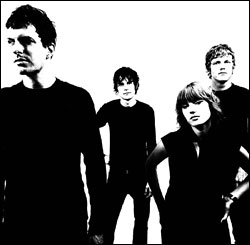Somewhere in the recesses of Daniel Smith’s psyche, a raging libido lurks. Not a bad one—and certainly not irresponsible—the hand that’s steered the family Danielson since 1995’s A Prayer for Every Hour is so thoroughly informed by deference to its creator and consideration for fellow critters that it might as well belong to Francis of Assisi. After all, we’re talking about a guy so haunted by the possibility that he might have inadvertently crushed a classmate’s trumpet bell in grade school that he wrote a song about it.
Granted, once he laments the titular instrument’s death with a resonant “oh, no” in the song’s intro, “Did I Step on Your Trumpet” waxes just as festive as everything else on Ships, the band’s seventh album and most celebratory to date. Given Smith’s M.O. and Ships‘ expanded lineup—a cast of 37 that includes Deerhoof, Sufjan Stevens, Why?, Steve Albini, members of Half-Handed Cloud, and everyone else Smith has worked with in the past or has made plans to work with at some point—it’d be surprising if the thing wasn’t an orgy of sweetness and light.
His appetite for propagation isn’t just numerical, either. Smith excels at creating oppositions, then reconciling them—just like in sex. Trumpet balances Smith’s elliptical chirp with a feminine chorus over a discretely rolling carpet of guitar, bass, drums, synth, piano, and whatnot—every moment molded for maximum nuance. There’s even a hint of spookiness. When the women echo his “You speak so much about my casket/My body basket/Did I do something wrong?” they omit the last line, letting the question hang—but only until they conclude with “Be just all you’re made to be/Papa is so mighty pleased with thee.”
The aforementioned father figure reference is about as close as Smith comes to directly name-checking his deity on the album. Considering the “Christian” tag the band’s been lugging around cheerfully since day one, the lacuna might be surprising if it wasn’t such a long time coming. When they were starting out, their faith was both unusual and a bit suspect. In the interim, they’ve had a lot to do with changing popular perceptions. From Stevens to Pedro the Lion, Christians abound in indie rock now, freeing Danielson to graze in greener pastures without straying too far from the fold.
Mostly, they concentrate on adapting their well-honed weirdness to a screen width reminiscent of ’50s Technicolor extravaganzas The Music Man and Oklahoma. Pretty much every song on the album refers to childhood at some point. Like the Animal Collective, Danielson excel at marrying lyrical nods to extreme youth with a decidedly adult musical vocab—which is where Smith’s libido really kicks in. Love him or hate him, he’s an oralist of the very highest degree, swooping, moaning, screeching, and doing pretty much everything with his mouth imaginable. Sure, he’s eccentric as hell, but that’s the payoff.








